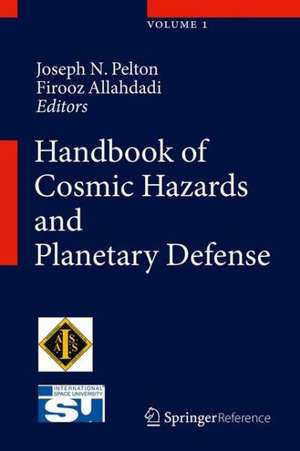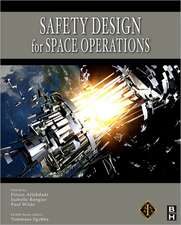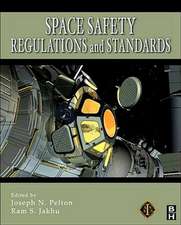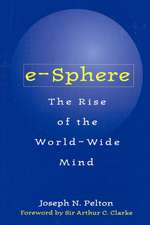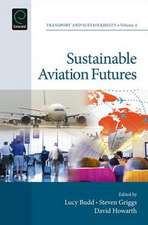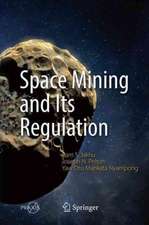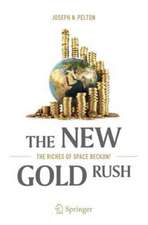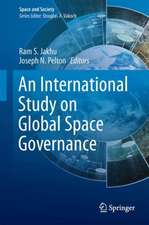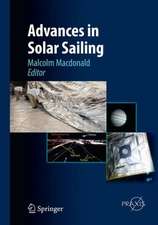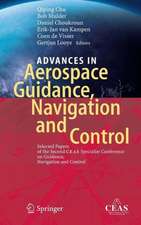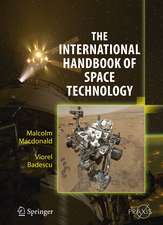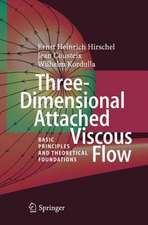Handbook of Cosmic Hazards and Planetary Defense
Editat de Joseph N. Pelton, Firooz Allahdadien Limba Engleză Hardback – 27 apr 2015
Preț: 3657.72 lei
Preț vechi: 4812.79 lei
-24% Nou
Puncte Express: 5487
Preț estimativ în valută:
699.100€ • 728.10$ • 577.88£
699.100€ • 728.10$ • 577.88£
Carte tipărită la comandă
Livrare economică 10-16 aprilie
Preluare comenzi: 021 569.72.76
Specificații
ISBN-13: 9783319039510
ISBN-10: 3319039512
Pagini: 1272
Ilustrații: LXX, 1127 p. 480 illus., 425 illus. in color. In 2 volumes, not available separately.
Dimensiuni: 155 x 235 x 73 mm
Greutate: 2.13 kg
Ediția:2015
Editura: Springer International Publishing
Colecția Springer
Locul publicării:Cham, Switzerland
ISBN-10: 3319039512
Pagini: 1272
Ilustrații: LXX, 1127 p. 480 illus., 425 illus. in color. In 2 volumes, not available separately.
Dimensiuni: 155 x 235 x 73 mm
Greutate: 2.13 kg
Ediția:2015
Editura: Springer International Publishing
Colecția Springer
Locul publicării:Cham, Switzerland
Public țintă
ResearchCuprins
Preface.- Foreword.- Introduction.- Space Hazards.- Key Space Missions for Exploration and Planetary Defense.- Ground-Based Observation Activities.- Planetary Defense Activities.- The Future of Planetary Defense.- Appendices.
Notă biografică
Joseph N. Pelton, Ph.D., is the principal of Pelton Consulting International. He is President of the International Space Safety Foundation and a member of the Executive Board of the International Association for the Advancement of Space Safety. He is the former Dean of the International Space University and Director Emeritus of the Space and Advanced Communications Research Institute (SACRI) at George Washington University. Dr. Pelton served as Director of the Accelerated Masters Program in Telecommunications and Computers at George Washington University from 1998 to 2004. Dr. Pelton was the Director of the Interdisciplinary Telecommunications Program at the University of Colorado from 1988 to 1997, and at the time it was the largest such graduate program in the U.S. He previously held various positions at Intelsat and Comsat, including serving as Director of Project SHARE and Director of Strategic Policy for Intelsat. Intelsat’s Project SHARE gave birth to the Chinese National TV University.
Dr. Pelton was the founder of the Arthur C. Clarke Foundation and remains as the Vice Chairman on its Board of Directors. He has been active in the Arlington, Virginia, community for many years as President of the Arlington County Civic Federation, as a member of the Long Range Planning Commission that initiated “smart growth” in Arlington and is currently Chairman of the IT Advisory Commission for Arlington County and Chair of the Civic Federation’s Environmental Committee.
Pelton is widely published with some 35 books written, co-authored or co-edited. His Global Talk won the Eugene Emme Literature Award and was nominated for a Pulitzer Prize. He is the co-author of the book Future Cities published by the Intelligent Communities Forum and is currently working on a book called Safe Cities that examines how broadband communications systems can make cities safer and more responsive to the needs of citizens and improve education and health care services. Most ofhis books are about space, satellite communications, and the future of technology and its impact on society. He is on the Advisory Board of the World Future Society and also frequently speaks and writes as a futurist.
Dr. Pelton is a member of the International Academy of Astronautics, an Associate Fellow of the American Institute of Aeronautics and Astronautics (AIAA) and a Fellow of the International Association for the Advancement of Space Safety (IAASS). He was the Founding President of the Society of Satellite Professional International (SSPI) and a member of the SSPI Hall of Fame. In 2005 he won the ISCe Award for excellence in education and has also won the International Communication Association (ICA) award as the educator of the year. For the last two years he has served as President of the Comsat Alumni and Retirees Association.
He received his degrees as follows: B.S. from the University of Tulsa, M.S. from New York University and his doctorate from Georgetown University.
Dr. Firooz Allahdadi served (1998-2011) at the United States of America HQ Air Force Safety Center in multiple capacities. He was the Center's Senior Technical Advisor, Director of Space Safety Division and the DoD representative in the presidentially mandated Inter-Agency Nuclear Safety Review Panel.
In 1998 Dr. Allahdadi employed rigorous scientific analysis to revamp the Air Force's conventional weapons operational safety and guidelines. This undertaking produced measurable operational efficiency and considerable real estate savings. He pioneered the Directed Energy Weapons (DEW) Safety initiative, leading teams of experts to identify and quantify the entire DEW hazards spectrum. He authored the governing DEW operation safety policies, AFPD 91-4, which has been benchmarked throughout US military.
As the DoD representative, Dr. Allahdadi oversaw special analysis, provided technical oversight and garnered Presidential Launch authorization for the two Martian launches "Spirit” and "Opportunity” in 2003, the "New Horizons Mission,” a journey to Pluto in 2005, and landing of the nuclear powered Rover "Curiosity” on the surface of Mars in 2010.
He founded and directed the Space Kinetic Impact and Debris Division (1990-1998) at the Air Force Research Laboratory. He led teams of scientists and engineers to develop high-fidelity analytical tools to predict dynamics of the debris clouds created from any space engagements. This technology was employed to simulate specific space scenarios for national security planning.
Dr. Allahdadi lectured on transport phenomenon and conducted research on several nationally important programs as a faculty member at University of New Mexico. He is a member of the National Research Council, Chief Editor of the International Society for Optical Engineering and has authored over 75 scientific papers.
Dr. Pelton was the founder of the Arthur C. Clarke Foundation and remains as the Vice Chairman on its Board of Directors. He has been active in the Arlington, Virginia, community for many years as President of the Arlington County Civic Federation, as a member of the Long Range Planning Commission that initiated “smart growth” in Arlington and is currently Chairman of the IT Advisory Commission for Arlington County and Chair of the Civic Federation’s Environmental Committee.
Pelton is widely published with some 35 books written, co-authored or co-edited. His Global Talk won the Eugene Emme Literature Award and was nominated for a Pulitzer Prize. He is the co-author of the book Future Cities published by the Intelligent Communities Forum and is currently working on a book called Safe Cities that examines how broadband communications systems can make cities safer and more responsive to the needs of citizens and improve education and health care services. Most ofhis books are about space, satellite communications, and the future of technology and its impact on society. He is on the Advisory Board of the World Future Society and also frequently speaks and writes as a futurist.
Dr. Pelton is a member of the International Academy of Astronautics, an Associate Fellow of the American Institute of Aeronautics and Astronautics (AIAA) and a Fellow of the International Association for the Advancement of Space Safety (IAASS). He was the Founding President of the Society of Satellite Professional International (SSPI) and a member of the SSPI Hall of Fame. In 2005 he won the ISCe Award for excellence in education and has also won the International Communication Association (ICA) award as the educator of the year. For the last two years he has served as President of the Comsat Alumni and Retirees Association.
He received his degrees as follows: B.S. from the University of Tulsa, M.S. from New York University and his doctorate from Georgetown University.
Dr. Firooz Allahdadi served (1998-2011) at the United States of America HQ Air Force Safety Center in multiple capacities. He was the Center's Senior Technical Advisor, Director of Space Safety Division and the DoD representative in the presidentially mandated Inter-Agency Nuclear Safety Review Panel.
In 1998 Dr. Allahdadi employed rigorous scientific analysis to revamp the Air Force's conventional weapons operational safety and guidelines. This undertaking produced measurable operational efficiency and considerable real estate savings. He pioneered the Directed Energy Weapons (DEW) Safety initiative, leading teams of experts to identify and quantify the entire DEW hazards spectrum. He authored the governing DEW operation safety policies, AFPD 91-4, which has been benchmarked throughout US military.
As the DoD representative, Dr. Allahdadi oversaw special analysis, provided technical oversight and garnered Presidential Launch authorization for the two Martian launches "Spirit” and "Opportunity” in 2003, the "New Horizons Mission,” a journey to Pluto in 2005, and landing of the nuclear powered Rover "Curiosity” on the surface of Mars in 2010.
He founded and directed the Space Kinetic Impact and Debris Division (1990-1998) at the Air Force Research Laboratory. He led teams of scientists and engineers to develop high-fidelity analytical tools to predict dynamics of the debris clouds created from any space engagements. This technology was employed to simulate specific space scenarios for national security planning.
Dr. Allahdadi lectured on transport phenomenon and conducted research on several nationally important programs as a faculty member at University of New Mexico. He is a member of the National Research Council, Chief Editor of the International Society for Optical Engineering and has authored over 75 scientific papers.
Textul de pe ultima copertă
Covers in a comprehensive fashion all aspects of cosmic hazards and possible strategies for contending with these threats through a comprehensive planetary defense strategy. This handbook brings together in a single reference work a rich blend of information about the various types of cosmic threats that are posed to human civilization by asteroids, comets, bolides, meteors, solar flares and coronal mass ejections, cosmic radiation and other types of threats that are only recently beginning to be understood and studied, such as investigation of the “cracks” in the protective shield provided by the Van Allen belts and the geomagnetosphere, of matter-antimatter collisions, orbital debris and radiological or biological contamination. Some areas that are addressed involve areas about which there is a good deal of information that has been collected for many decades by multiple space missions run by many different space agencies, observatories and scientific researchers. Other areas involving research and studies that have only recently gotten underway are discussed by some of the world’s foremost experts in each of these areas, who provide up-to-date and scientifically verifiable information. Although much of the work in these various areas have been conducted by space agencies, an expanding range of work is also being carried out by observatories, by universities and other research centers, and even by private foundations and professional organizations. The purpose of this work is thus several-fold: to include the latest information and most systematic research from around the world in a single reference work; to note where there are significant gaps in knowledge where new research, spacecraft, observatories, or other initiatives are needed to fill in critical missing information; and to give the best possible information about preventative actions that might be taken against cosmic threats and identify various alternative strategies that are now under way or planned to cope with these various threats.
Caracteristici
Includes articles on research and policy recommendations from top experts in the field Contains comprehensive advice for engineering "space sustainability" Outlines the extent of the orbital space debris problem and offers practical solutions Includes supplementary material: sn.pub/extras
